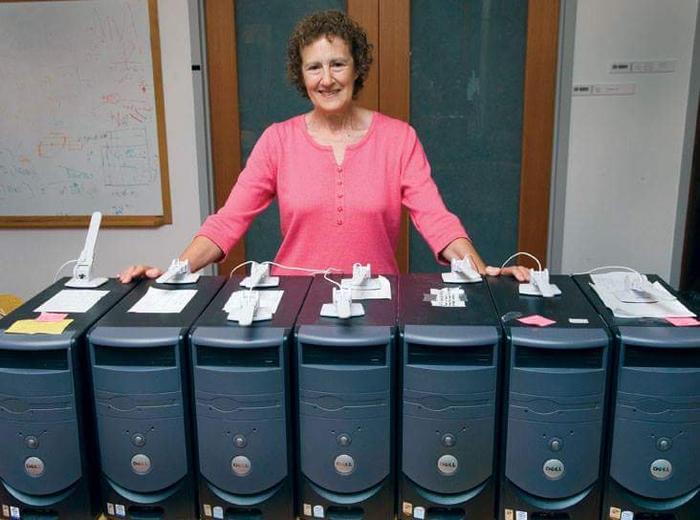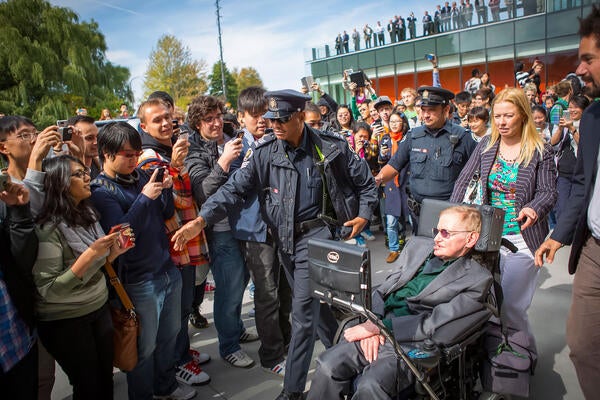
Waterloo welcomes two female computer science legends to campus
Barbara Liskov and Shafi Goldwasser (pictured above) are two of only three women to have won the prestigious Turing Award

Barbara Liskov and Shafi Goldwasser (pictured above) are two of only three women to have won the prestigious Turing Award
By University RelationsIn its 52-year history only three women have won the Turing Award — the highest distinction in computer science and the "Nobel Prize of computing." Two of those women are receiving honourary doctorates at Waterloo’s Spring 2019 convocation.
Barbara Liskov and Shafi Goldwasser, the two most recent female Turing winners, are guests of the Faculty of Mathematics as they receive honourary Doctor of Mathematics degrees.
Shafira (Shafi) Goldwasser is one of today’s leading computer scientists, known for her contributions to the foundations of cryptography, computational number theory, complexity theory, fault-tolerant distributed computing, probabilistic proof systems, and approximation algorithms. She co-invented semantically secure probabilistic encryption providing secure communications and transactions over the internet.
Goldwasser also co-invented pseudorandom functions and zero-knowledge proofs — a new idea at the time. Zero-knowledge proofs deal with the security of cryptographic protocols by controlling leakage of knowledge. Additionally, she proved primality using elliptic curves with another co-inventor.
In 2018, Goldwasser became the Director of the world’s leading venue for collaborative research in theoretical computer science, the Simons Institute for Theory of Computing at the University of California, Berkeley. Currently she is an RSA Professor of Electrical Engineering and Computer Science at the Massachusetts Institute for Technology (MIT), and she also holds a professorship at Weizmann Institute of Sciences in Israel.
 Goldwasser is joined by fellow MIT professor Barbara Liskov, the second women in history to win the Turing award.
Goldwasser is joined by fellow MIT professor Barbara Liskov, the second women in history to win the Turing award.
Liskov holds several honours for her groundbreaking work on software systems design and development of the first methodology for organizing a program around data abstraction. Her early work focused on artificial intelligence; however, her work in software systems design has gained the most attention.
Her research contributions have led to it being easier to build and maintain complex computing systems. She also designed Thor — arguably the first high-performance, large-scale distributed persistent object system.
Early on, she saw the importance of fault tolerance. Using nested transactions, which don't conflict with the actions of a parent transaction, Liskov provided a natural foundation for building fault-tolerant distributed systems. The nested transactions she developed led to the building of the Java RMI system and CORBA standards around these transactions. Several distributed systems around the world incorporate her work. Her solution to the Byzantine Agreement problem was the first practically useful solution. In addition, the ideas Liskov pioneered in a programming language she designed called CLU, lie at the heart of C++, C#, Java, Python, and .net languages.
In 2008, Liskov was awarded the Turing Award for her “contributions to practical and theoretical foundations of programming languages and system design, especially related to data abstraction, fault tolerance and distributed computing.”
With Waterloo’s long history of software systems design, cryptography, privacy, and security, it is fitting that Goldwasser and Liskov are receiving an honorary doctorate on Friday, June 14. They also gave a talk on June 13 and participated in a panel moderated by Maura Grossman, a researcher and director of Women in Computer Science in the School of Computer Science at Waterloom, as part of the Turing Symposium and Celebrating Women in Computer Science.

Read more
World renowned theoretical physicist dies at the age of 76.

Read more
Author Si'Yam Lee Maracle’s unflinching look at life on Turtle Island under settler colonialism propelled a generation of storytellers

Read more
Computer scientists are moving us from tap and touch to gestures when it comes to controlling your smart phone
The University of Waterloo acknowledges that much of our work takes place on the traditional territory of the Neutral, Anishinaabeg, and Haudenosaunee peoples. Our main campus is situated on the Haldimand Tract, the land granted to the Six Nations that includes six miles on each side of the Grand River. Our active work toward reconciliation takes place across our campuses through research, learning, teaching, and community building, and is co-ordinated within the Office of Indigenous Relations.